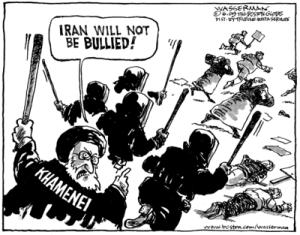- MENU
- HOME
- SEARCH
- WORLD
- MAIN
- AFRICA
- ASIA
- BALKANS
- EUROPE
- LATIN AMERICA
- MIDDLE EAST
- United Kingdom
- United States
- Argentina
- Australia
- Austria
- Benelux
- Brazil
- Canada
- China
- France
- Germany
- Greece
- Hungary
- India
- Indonesia
- Ireland
- Israel
- Italy
- Japan
- Korea
- Mexico
- New Zealand
- Pakistan
- Philippines
- Poland
- Russia
- South Africa
- Spain
- Taiwan
- Turkey
- USA
- BUSINESS
- WEALTH
- STOCKS
- TECH
- HEALTH
- LIFESTYLE
- ENTERTAINMENT
- SPORTS
- RSS
- iHaveNet.com
by Anna Mulrine

Obama administration officials have urged caution in a response to Iran
The violence came as promised.
As students from Tehran University continued to take to the streets last week to protest the disputed results of the nation's presidential election, Iran's powerful militias responded with baton beatings, tear gas, and gunfire.
"Flexing muscle on the streets after the election is not right," warned Iran's supreme leader, Ayatollah Ali Khamenei, in the days before the bloodshed. "If they don't stop, the consequences of the chaos would be their responsibility."
Those consequences included casualties that resulted from the worst upheaval in Tehran in 30 years, as well as mass arrests last week, with more than 600 protesters jailed, according to Iranian government estimates. Some 70 professors were also detained after meeting with the chief presidential challenger, Mir Hossein Mousavi.
U.S. officials in Washington have been watching to see whether the crackdown would prompt Mousavi -- a long-time insider -- to back down or risk a bitter rift with Iran's ruling clerics. The protests have been a direct challenge to Khamenei, who validated the elections and dismissed charges of fraud, noting that "perhaps 100,000 or 500,000" votes might be in question, "but how could anyone tamper with 11 million votes?"
Unmoved by this logic, Mousavi said that he would not relent, adding that he was determined to prove election fraud after incumbent President Mahmoud Ahmadinejad claimed 63 percent of the votes in what was widely considered to be a hotly contested election.
The question in Washington has been how best to respond.
Obama administration officials urged caution; accusations of American meddling in Iran are a popular rallying tool for Iranian authorities. But as videos of the graphic death of Neda Agha-Soltan, an Iranian student, went viral, President Obama racheted up his rhetoric, declaring the United States "appalled and outraged."
The impact of this sharper tone remains to be seen in Washington, where U.S. officials have been hoping to restart talks with Iran on its nuclear program. Ahmadinejad warned that there would be "nothing left to talk about" if Obama kept up his comments. Across town at a conference of the military heads of several Persian Gulf states, Defense Secretary Robert Gates last week called on gulf states to support Iraq and, in so doing, help to curtail Iranian aggression.
The U.S. military has long accused Iran of providing arms to Shiite militias in Iraq, and Gates noted that Iran's "regional meddling has already cost far too many lives." The remarks tacitly acknowledge, however, that Iran still has the ability to stir up violence in Iraq during a fragile time. This did not stop U.S. officials from issuing another eyebrow-raising warning:
Iran's future "must not include a nuclear weapon," and to ensure that aim, Gates said, America "will take action by conducting counterterrorism operations and sharing intelligence for the interdiction of illegal shipments of weapons or materiel."
The threats are not empty, U.S. defense officials promise. Iranian authorities said the same of their own warnings to protesters.
However, the demonstrators continued to gather in the streets and, in the evening, to shout, "Down with the dictators," from their rooftops.